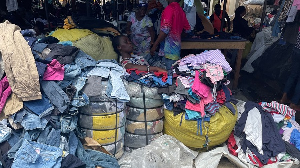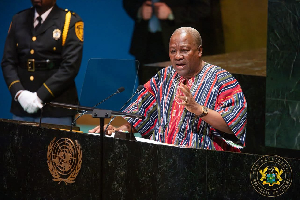The proliferation of second-hand clothing, often referred to as "obroni waawu" in Ghana, has significant implications for both the economy and the environment.
While these garments provide affordable fashion and economic opportunities, they also contribute to climate challenges. This article explores how second-hand clothing affects the climate in Ghana and discusses viable solutions to mitigate these impacts while promoting sustainable practices.
The influx of second-hand clothing has created a complex dynamic in Ghana’s textile industry. While it offers affordable clothing options, the sheer volume of imported used garments can lead to a culture of disposability.
Many of these clothes end up discarded after a short period of use, contributing to significant textile waste. According to estimates, Ghana receives over 15 million items of second-hand clothing annually, leading to mountains of waste that can overwhelm local disposal systems.
The improper disposal of these garments often results in pollution. Many end up in landfills or are burned, releasing toxic chemicals into the atmosphere. This not only contributes to greenhouse gas emissions but also poses health risks to communities living near these waste sites.
The demand for fast fashion in the global market has far-reaching consequences, including deforestation and depletion of resources in producing countries. While Ghana’s textile consumption is heavily reliant on second-hand imports, the underlying issues in the global fashion industry contribute to climate change. The agricultural practices involved in cotton farming, for example, often lead to habitat destruction and soil degradation.
Moreover, the energy-intensive processes involved in the production and transportation of textiles globally result in significant carbon emissions. Even though second-hand clothing is a more sustainable option compared to new fast fashion, its environmental footprint can still be substantial when considering the entire lifecycle of these garments.
In solving the problem, educating consumers about the environmental impacts of second-hand clothing and promoting sustainable consumption practices is essential. Awareness campaigns can inform the public about the importance of mindful shopping, such as buying quality items that last longer and reducing impulsive purchases.
Encouraging local communities to engage in clothing swaps, thrift markets, and upcycling projects can foster a culture of sustainability. These initiatives not only reduce waste but also promote a sense of community and shared responsibility for the environment.
Also, supporting local textile manufacturers who produce clothing sustainably can reduce reliance on second-hand imports. This can create jobs and encourage the use of eco-friendly materials. The government and NGOs can facilitate training programs to equip local artisans with the skills needed to produce high-quality garments.
Encouraging local textile producers to adopt sustainable practices, such as organic farming for cotton and environmentally friendly dyes, can significantly reduce the industry’s carbon footprint. Certification programs for sustainable textiles can also help consumers make informed choices.
In implementing effective waste management practices, establishing efficient textile recycling programs can help manage the waste generated from second-hand clothing. Local governments and organizations can collaborate to create facilities that process discarded garments into reusable materials, thereby reducing landfill waste.
Creating awareness about responsible disposal methods for used clothing, such as donation, recycling, or resale, can help divert waste from landfills. Programs that encourage consumers to return or donate clothing can promote circularity in the textile economy.
With policy regulation, the Ghanaian government can introduce regulations to manage the importation of second-hand clothing, ensuring that only high-quality items enter the market. This can help reduce the influx of substandard garments that are more likely to be discarded.
Furthermore, offering tax breaks or incentives for businesses that engage in sustainable production and waste management can encourage more eco-friendly practices in the textile industry.
While second-hand clothing plays a vital role in providing affordable fashion and economic opportunities in Ghana, it also presents significant challenges related to climate change and environmental degradation. By implementing solutions that promote sustainable consumption, strengthen local textile production, enhance waste management strategies, and establish effective policy frameworks, Ghana can mitigate the climate impacts of second-hand clothing.
These efforts will not only contribute to a healthier environment but also foster economic resilience and social responsibility.
Embracing sustainability in the fashion industry is not merely an option; it is a necessity for safeguarding the future of Ghana’s climate and its communities. Through collective action, awareness, and innovation, Ghana can transform the second-hand clothing phenomenon into an opportunity for sustainable development.
Business News of Sunday, 29 December 2024
Source: Godsway Kwame McJoseph, Contributor













